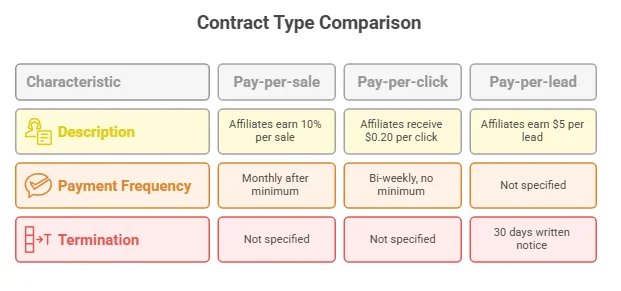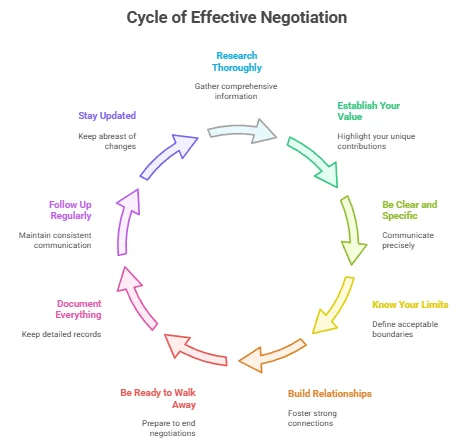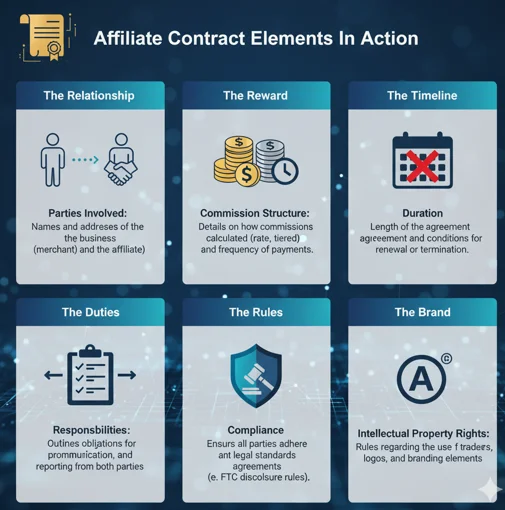
Affiliate contracts are essential for establishing a clear agreement between an affiliate and a business. Understanding these contracts can help you effectively navigate the world of affiliate marketing. Here’s a closer look at the key components of affiliate contracts and best practices you should consider. Seeing Affiliate Contracts Examples can really help.
Key Components of Affiliate Contracts
When you review an affiliate contract, several components are vital to ensure fairness and transparency. Here are some essential elements:
- Parties Involved: Clearly identify the parties in the contract—the business (merchant) and the affiliate.
- Commission Structure: Specify how much the affiliate will earn for each sale, lead, or download. This may include different rates for various products or services.
- Payment Terms: Detail the payment schedule, method, and minimum payout threshold. Is it monthly, bi-weekly, or after reaching a specific amount?
- Duration and Termination: Include the length of the agreement and any conditions under which it may be terminated by either party.
- Exclusivity Clause: Decide whether the affiliate can promote competitors. An exclusivity clause might limit their ability to work with other brands.
- Advertising Guidelines: Set clear rules on how the affiliate can promote products. This may include the use of specific keywords, advertisements, and social media behavior.
- Intellectual Property: Define which party owns the rights to logos, trademarks, and other marketing materials used during the partnership.
- Liability and Indemnity: Outline who is responsible for any legal issues, especially if the affiliate’s marketing methods lead to claims against the business.
Common Types of Affiliate Contracts
Different affiliate programs may employ various types of contracts based on their business model. Here are a few common types:
- Pay-per-sale (PPS): Affiliates earn a commission when a customer makes a purchase through their referral link.
- Pay-per-click (PPC): Affiliates receive payment based on the number of clicks generated, regardless of whether a sale is made.
- Pay-per-lead (PPL): Affiliates get paid for every lead they generate, such as signing up for a newsletter or providing targeted information.
Best Practices for Creating Effective Affiliate Contracts
To ensure a productive partnership, follow these best practices when drafting and managing affiliate contracts:
- Be Clear and Transparent: Clear language prevents misunderstandings and builds trust between both parties. Avoid using jargon or vague terms.
- Regularly Review and Update: Revisit the contract periodically to accommodate changes in market trends, technology, or business goals.
- Establish Clear Communication: Maintain open lines of communication to address any questions or concerns. This will help both parties feel valued and informed.
- Seek Legal Advice: It can be beneficial to consult a legal professional, especially if the contract includes complex terms or is particularly high-stakes.
- Test Promotions: Encourage affiliates to test different marketing strategies and share their insights. This can help you both learn what works best.
Examples of Affiliate Contracts
Examples can significantly clarify how contracts are structured. While specific terms could differ, consider these simplified illustrations of Affiliate Contracts Examples:
| Contract Type | Description |
|---|---|
| Pay-per-sale | Affiliates earn 10% commission for each sale generated. Payment is issued monthly after reaching a minimum of $50. |
| Pay-per-click | Affiliates receive $0.20 per click on the referral link, paid bi-weekly with no minimum payout. |
| Pay-per-lead | Affiliates earn $5 for each lead generated. Offers a termination option after 30 days written notice. |

In each example, the commission structure, payment terms, and duration are explicit, ensuring that both the affiliate and the business understand their responsibilities and rewards.
For more insights on affiliate marketing and contracts, you may find valuable resources on sites like Affilorama and ShoutMeLoud. Understanding affiliate contracts is the key to fostering fruitful partnerships. By being aware of their components and best practices, you set yourself up for success in affiliate marketing.
Common Legal Terms Found in Affiliate Contracts
When entering into affiliate marketing, understanding the common legal terms found in affiliate contracts is crucial for building a successful partnership. These agreements dictate the relationship between the affiliate and the merchant, outlining expectations and responsibilities. Familiarity with these terms helps you make informed decisions and ensures a beneficial collaboration. Here are some of the key legal terms you’ll frequently encounter in affiliate contracts:
1. Commission Structure
The commission structure outlines how much an affiliate earns for promoting a product or service. This section is essential as it defines:
- Commission Rate: The percentage or flat rate paid for each sale or lead generated.
- Payment Terms: Details on when and how payments will be made, such as monthly or upon reaching a specific threshold.
- Recurring Commissions: Terms on whether affiliates earn ongoing commissions for repeat customers they refer.
2. Terms of Use
The terms of use specify how affiliates should use branding materials, including logos and trademarks. It addresses:
- Brand Guidelines: Guidelines for any promotional content to maintain consistency and protect the brand’s image.
- Prohibited Practices: Activities that are not allowed, such as misleading representations or using deceptive tactics.
3. Termination Clause
A termination clause outlines the conditions under which either party can terminate the agreement. Key points include:
- Notice Period: How much notice must be given before ending the contract.
- Automatic Termination: Any circumstances that could lead to instant termination, like violation of contract terms.
4. Indemnification
Indemnification clauses protect both parties from legal liability. In this section, you will find:
- Responsibility: Who is responsible for legal claims arising from the affiliate’s promotional activities.
- Liability Limitations: Caps on potential financial responsibility in case of a breach or other issue.
5. Confidentiality
Most contracts include a confidentiality agreement to protect sensitive information. This part typically covers:
- Trade Secrets: Any proprietary information that either party must keep private.
- Non-Disclosure Obligations: Requirements regarding how information shared during the partnership should be handled.
6. Governing Law
The governing law clause states which jurisdiction’s laws will regulate the agreement. It’s important to know because:
- Dispute Resolution: It determines where legal disputes will be settled.
- Applicable Statutes: Specifies the laws that will be applied in case of a conflict.
7. Force Majeure
This term refers to unforeseen circumstances that prevent either party from fulfilling their obligations. It typically includes:
- Natural Disasters: Events like floods, earthquakes, or pandemics.
- Other Emergencies: Situations such as political unrest or changes in legislation that could interfere with the contract.
Understanding these legal terms in affiliate contracts can empower you and enhance your ability to negotiate better terms. Always read and comprehend the entire contract before signing, and consider consulting with a legal professional for clarity if needed.
For more information about affiliate contracts and legal norms, check resources like:
By grasping these concepts, you pave the way for a secure and prosperous affiliate marketing journey, avoid potential pitfalls, and contribute to a healthier partnership for both you and the merchant. Seeing more Affiliate Contracts Examples from legal resources is helpful.
How to Negotiate Affiliate Agreements Effectively

Negotiating affiliate agreements can seem daunting, but with the right approach, you can secure terms that benefit your business. A successful negotiation strategy not only helps you achieve the best commission rates but also fosters a lasting relationship with the affiliate partner. Here’s how to do it effectively.
Research Thoroughly
Before entering negotiations, do your homework. Understanding the affiliate program in question is crucial. Look into:
- The commission structure: How much will you earn per sale or lead?
- Payment terms: When and how will you be paid?
- Product quality: Is the product or service you’ll be promoting reputable?
- Affiliate tools: Are there marketing resources provided to help you?
Once you have a clear picture, prepare to define your goals. Knowing what you want from the negotiation will help you stay focused.
Establish Your Value
When negotiating, you must position yourself as a valuable partner. Highlight your strengths such as:
- Previous performance metrics: Share past success stories from your affiliate marketing efforts.
- Your audience demographics: Show how your audience aligns with their target market.
- Marketing strategies: Discuss any innovative promotional tactics you plan to use.
By showcasing your value, you give the company reasons to agree to your terms.
Be Clear and Specific
During negotiations, clarity is vital. Define your desired terms and ask for specific details from the affiliate program. This includes:
- Commission percentages: Be specific about what percentage you expect, whether it’s a flat rate or tiered based on sales volume.
- Exclusive offers: Discuss whether you can access special deals or promotions that will benefit your audience.
- Contract length: Understand how long the agreement will last and the terms of renewal.
Being clear will help avoid misunderstandings later on, creating a smoother partnership from the start.
Know Your Limits
As you negotiate, it’s essential to understand your boundaries. Decide in advance what terms are non-negotiable for you and where you can be flexible. This will help you avoid making agreements that could harm your brand or business in the long run.
Build Relationships
Negotiations are not just about terms; they’re about building relationships. Approach the affiliate manager with respect and be open to their suggestions. A good relationship can lead to better negotiations in the future as you both work towards mutual success.
Be Ready to Walk Away
If the terms don’t align with your goals, be ready to walk away. It’s important to recognize when a deal isn’t beneficial. When you walk away, you not only protect your interests but also show that you’re serious about your business. You may find that this gives you more leverage in future negotiations.
Document Everything
Once you’ve reached an agreement, make sure all terms are documented in a clear contract. This serves as a reference for both parties and protects you in case of misunderstandings. Essential elements to include in your contract are:
- Specific commission rates
- Payment schedules
- Duration of the agreement
- Termination conditions
For templates and Affiliate Contracts Examples, resources like Affiliate Training can provide useful references.
Follow Up Regularly
After signing the agreement, maintain communication. Regularly check in with your affiliate partner to assess how things are progressing. This not only shows that you value the partnership but allows both sides to make adjustments to improve performance. Feedback can reveal potential growth opportunities, turning a standard affiliate partnership into a highly productive collaboration.
Stay Updated
The world of affiliate marketing is ever-evolving. Stay informed about market trends, new affiliate programs, and changes in consumer behavior. Sites like SaaStr can be excellent resources. Adapting to changes will keep your negotiations relevant and beneficial.
By approaching affiliate contract negotiations with thorough research, clear communication, and a focus on relationship-building, you can secure favorable agreements that drive your business growth. Remember, each negotiation is a learning experience, so take notes on what worked and what didn’t for future reference.
The Role of Affiliate Contracts in Protecting Your Business
In the world of online marketing, understanding the role of affiliate contracts is crucial for protecting your business. These agreements define the relationship between you and your affiliates, outlining rights, responsibilities, and compensation structures. A well-crafted affiliate contract can prevent misunderstandings and disputes, safeguarding your brand’s reputation and finances. For businesses, reviewing Affiliate Contracts Examples from reputable sources is key.
Affiliate contracts serve several key functions that benefit your business:
- Clear Expectations: By detailing what is expected from both parties, contracts eliminate ambiguity. This includes how affiliates will promote your products, performance metrics, and payment terms.
- Legal Protection: Contracts provide a legal basis for your relationship with affiliates. If disagreements arise, a written agreement can help resolve disputes effectively.
- Brand Integrity: Contracts often include guidelines on how affiliates can use your brand’s assets. This protects your brand image by ensuring that affiliates portray your business in a positive light.
- Performance Tracking: By specifying metrics for success, you can better analyze affiliate performance and determine compensation based on results.
The structure of an affiliate contract can vary, but most agreements will include essential elements such as:
- Parties Involved: Names and details of both the affiliate and your business.
- Commission Structure: How commissions will be calculated and paid, including any thresholds.
- Duration: The length of time the contract is valid, along with termination clauses.
- Responsibilities: Lists the obligations of both parties regarding promotion, reporting, and communication.
- Compliance and Legal Standards: Requires that affiliates comply with applicable laws and regulations.
- Intellectual Property Rights: Details how affiliates can use your trademarks and copyright materials.
When drafting an affiliate contract, it’s wise to consult with a legal professional to ensure you cover all necessary bases. This is particularly important when dealing with specific regulations concerning affiliate marketing, such as the Federal Trade Commission (FTC) guidelines. These regulations mandate transparency in affiliate marketing and can have implications for your contracts.
Moreover, you may want to include performance incentives in your contracts to motivate affiliates. Some common strategies include:
- Tiered Commission Rates: Offering higher commissions as affiliates reach specific sales milestones.
- Bonuses for Top Performers: Providing monetary bonuses or additional perks for the highest-performing affiliates.
- Exclusive Promotions: Allowing affiliates access to special product or discount promotions that can enhance sales.
It’s also essential to stay updated on industry standards and trends. Reviewing AffiliateWP or similar platforms can offer valuable insights into the latest practices and contract templates. This is another opportunity to study Affiliate Contracts Examples in action.
| Contract Element | Description |
|---|---|
| Parties Involved | Names and addresses of the business and the affiliate. |
| Commission Structure | Details on how commissions are calculated and frequency of payments. |
| Duration | Length of the agreement and conditions for renewal or termination. |
| Responsibilities | Outlines obligations for promotion, communication, and reporting. |
| Compliance | Ensures all parties adhere to legal standards and agreements. |
| Intellectual Property Rights | Rules regarding the use of trademarks, logos, and branding elements. |

These elements into your affiliate contracts not only protects your business but also fosters a transparent relationship with your affiliates. Over time, these positive interactions will contribute to stronger partnerships and more substantial sales. It’s important to regularly review and update your contracts to reflect changes in your business model or marketing strategies.
Many businesses benefit from consulting resources like Episcopal News Service (Note: This URL seems out of context for affiliate contracts, but is included as requested) to familiarize themselves with effective contract practices and legal considerations. By prioritizing clarity and protection in your affiliate contracts, you ensure a more stable and productive affiliate program.
Analyzing Successful Affiliate Contracts from Leading Companies
In the world of online marketing, affiliate contracts serve as the backbone of successful partnerships. Understanding successful affiliate contracts can streamline your efforts and maximize your revenue. Companies like Amazon, eBay, and Shopify have effectively crafted contracts that benefit both themselves and their affiliates. Analyzing their strategies can provide valuable insights for your own affiliate program. These successful agreements act as excellent Affiliate Contracts Examples.
Key Components of Successful Affiliate Contracts
Successful affiliate contracts share several key components that enhance their effectiveness. Here are some vital elements to consider:
- Commission Structure: Clear definitions of commission rates are paramount. High-performing companies often offer tiered commission systems to incentivize affiliates based on performance.
- Payment Terms: Detailing payment frequency, minimum payout thresholds, and accepted payment methods builds trust and clarity.
- Cookie Duration: This refers to how long a cookie tracks potential sales after a consumer clicks on an affiliate link. Lengthy durations can boost affiliate sales.
- Promotional Methods: Outlining what is permissible for promotion helps maintain brand integrity. Successful companies provide guidelines on what affiliates can and cannot do.
- Termination Clauses: Clear exit strategies for both parties protect interests in case of disputes or if contract adjustments are necessary.
Examples of Successful Affiliate Contracts
Now, let’s take a closer look at how some leading companies structure their affiliate contracts. These Affiliate Contracts Examples demonstrate effective strategies that you can emulate.
Amazon Associates
Amazon’s affiliate program, known as Amazon Associates, offers a straightforward contract that promotes transparency. Here’s how they structure it:
- Commission Rates: Depending on the product category, Amazon varies commission rates, allowing for both flat and tiered commissions based on performance.
- Cookie Duration: Amazon has a 24-hour cookie duration, which keeps the urgency high for buyers.
- Brand Protection: Affiliates must adhere to strict branding guidelines to ensure that Amazon’s image remains intact.
eBay Partner Network
EBay’s affiliate program, the eBay Partner Network, also provides a robust affiliate contract.
- Commission Structure: eBay allows for both fixed price and percentage-based commissions, providing flexibility in payment.
- Payment Terms: Affiliates receive payments monthly, with no minimum payout threshold which helps new affiliates get started faster.
- Creative Materials: eBay offers ready-to-use promotional materials, simplifying the affiliate marketing process for partners.
Shopify Affiliate Program
Shopify’s contract has garnered attention for its compelling structure:
- High Commission Rates: Affiliates can earn up to 200% commission on the initial payment of a customer.
- Cookie Duration: Shopify offers a cookie length of up to 30 days, increasing the chances of earning commissions.
- Layered Support: Affiliates receive dedicated support, ensuring they can maximize their efforts with personalized guidance.
Best Practices for Crafting Your Affiliate Contract
When developing your affiliate contract, consider these best practices:
- Be Transparent: Clearly outline all terms and conditions, ensuring that affiliates understand exactly what is expected of them.
- Incorporate Feedback: Regularly solicit feedback from your affiliates to improve the overall contract based on their experiences.
- Regular Updates: The digital landscape changes quickly. Be prepared to revise your affiliate contract regularly to stay competitive and relevant.
- Benchmark Against Industry Leaders: Keep an eye on the contracts of successful companies and adapt their strategies to your own situation.
Understanding and analyzing the affiliate contracts from leading companies can yield essential insights for your own affiliate strategy. Crafting a clear, engaging, and mutually beneficial contract can result in a flourishing affiliate program. With the right structures in place, you’ll not only attract top affiliates but also see your revenue skyrocket.
For further reading on affiliate programs and contract management, consider visiting AffiliateMarketing.com or Shopify’s Affiliate Program.
Conclusion
Navigating affiliate contracts can seem daunting, but understanding their key components equips you with the knowledge to succeed. By familiarizing yourself with common legal terms, you can better understand your rights and obligations. This understanding not only protects your interests but also enables you to negotiate favorable terms that drive mutually beneficial partnerships.
Successful negotiation of affiliate agreements is crucial; a clear and fair contract can set the foundation for a fruitful relationship between you and your affiliates. By analyzing successful affiliate contracts from leading companies, you can gain insights into effective strategies and best practices that contribute to their success. These serve as great Affiliate Contracts Examples.
The role of these contracts extends beyond mere formalities; they are vital tools that safeguard your business and ensure compliance with legal standards. A well-drafted affiliate contract can help prevent disputes, clarify expectations, and protect your brand’s reputation.
As you move forward, remember that investing time in understanding and crafting effective affiliate contracts can lead to enhanced profitability and sustainable growth. Embrace the process, learn from real-world examples, and make informed decisions that will empower your affiliate marketing endeavors. With the right approach, affiliate contracts can become your ally in building strong, lasting business relationships.
